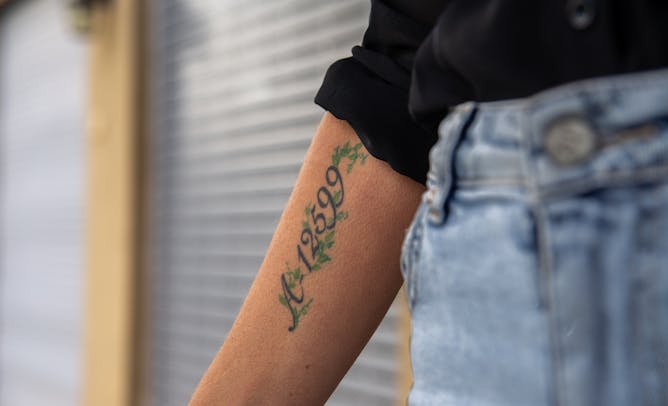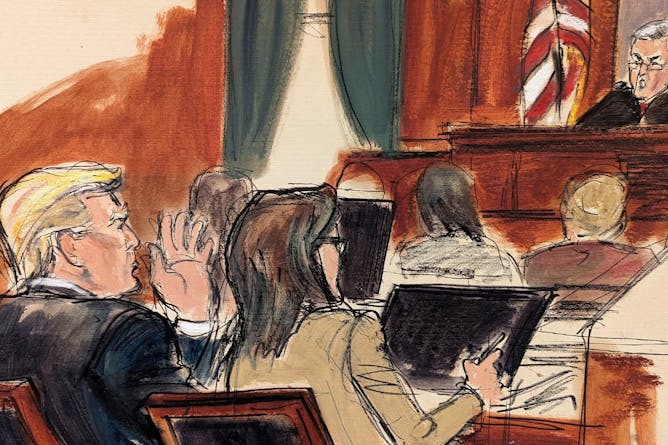|
|
|
|
In Jewish tradition, tattooing is largely taboo. For many, an inked mark on the body is as incompatible with Levitical law as it is irreconcilable with the memory of the Holocaust. One million Jews died in Auschwitz. And for the 79 years since the concentration camp complex was liberated on January 27 1945, those who survived – and their children, and their children – have lived with the indelible legacy of the serial numbers the Nazis forcibly tattooed on their forearms.
And yet, a small but growing number of those children and grandchildren are choosing to replicate the numbers on their own bodies. Sociologist Alice Bloch at the University of Manchester, has spent the past five years trying to unpack the potency of this gesture.
In this investigation, Bloch relays the reasons the people she has interviewed have given for wanting, as the son of one Auschwitz survivor puts it, to “walk with the number”. They see their tattoos as living memorials and familial symbols, as love embodied.
For The Conversation Weekly podcast, I spoke to Bloch, and two of her interviewees, David Rubin and Orly Weintraub Gilad. As ever-fewer survivors remain and the Holocaust passes out of living memory, they bear witness to the imperative of finding new ways to never forget what happened.
|

|
Dale Berning Sawa
Commissioning Editor, London
|
|

Orly Weintraub Gilad with her grandfather’s Auschwitz number, A-12599, tattooed on her arm.
John Jeffay for The Conversation
Alice Bloch, University of Manchester
As the Holocaust passes out of living memory, such embodied memorialisation ensures people will still talk about what happened.
|

Judge Lewis Kaplan, right, admonishes Donald Trump and his attorney Alina Habba in court.
Elizabeth Williams/AP
John E. Jones III, Dickinson College
A retired federal judge sheds light on what’s going on in Judge Lewis Kaplan’s courtroom during the latest trial involving former President Donald Trump.
|

Karol G performing at the Hard Rock Stadium in Miami, Florida on 27 August 2023.
Geoffrey Clowes/Shutterstock
Lourdes Moreno Cazalla, Universidad Nebrija
A quarter of the streaming charts now feature music in Spanish, and interest in the language is surging as a result.
|
|
|
-
David Lowe, Deakin University; Andrew Singleton, Deakin University; Joanna Cruickshank, Deakin University
New polling shows a significant drop in support for January 26 in just two years.
-
Kyle Atkins-Weltman, Oklahoma State University; Eric Snively, Oklahoma State University
Rather than a juvenile of a known species, several fossilized bones represent a new species – and shed light on the question of whether dinosaurs were already in decline before disaster struck.
-
Stephen Wessels, University of Cape Town; Benjamin Schoville, The University of Queensland; Jayne Wilkins, Griffith University; Sechaba Maape, University of the Witwatersrand
One criticism of current 3D models of archaeological sites is that they are presented devoid of human traces and history.
-
Andrew van der Vlies, University of Adelaide
The fiction of J.M. Coetzee is always formally daring, brave in its social critique and its refusal to play by the rules.
-
Marick Masters, Wayne State University
In close races, support from the United Auto Workers and the rest of organized labor could prove decisive.
-
Dal Yong Jin, Simon Fraser University
‘Past Lives’ is a beautiful story of childhood crushes, and the sorrow and agony that ensues when one party sends another party away to move to another stage of his or her life.
-
Leah Hamilton, Mount Royal University; Yvonne Su, York University, Canada
Who’s responsible for the factors that led to the federal government’s recently announced cap on international students, and what are the implications for those directly affected?
|
|
| |
| |
| |
| |
|
|
|
|
|
|
|